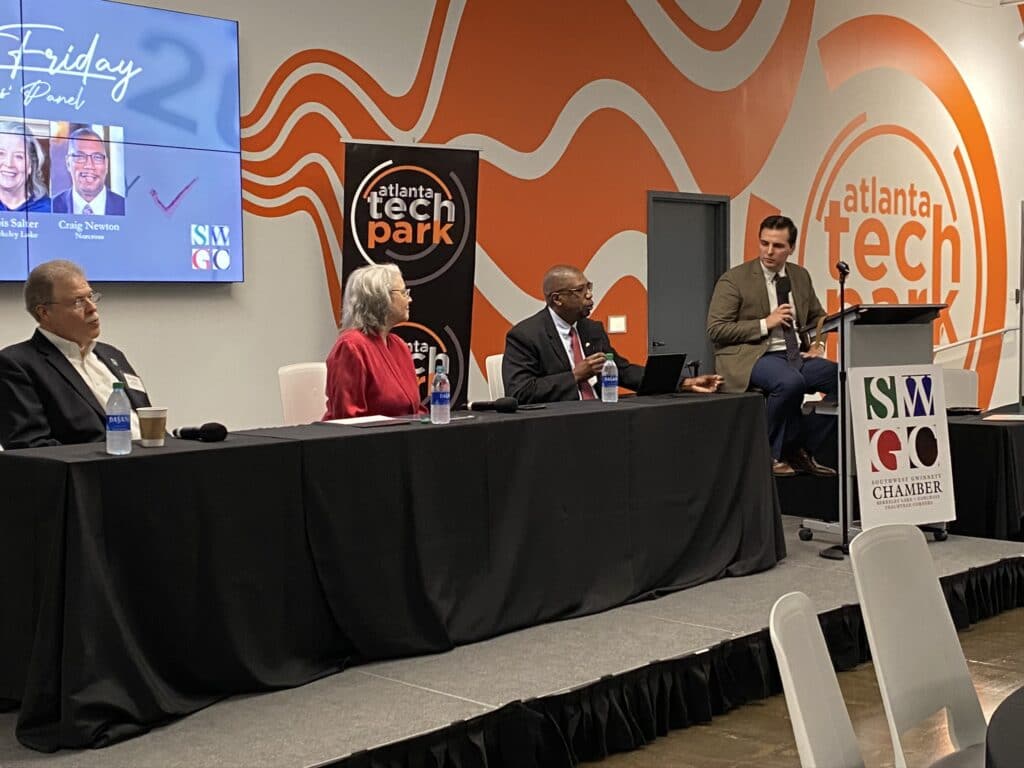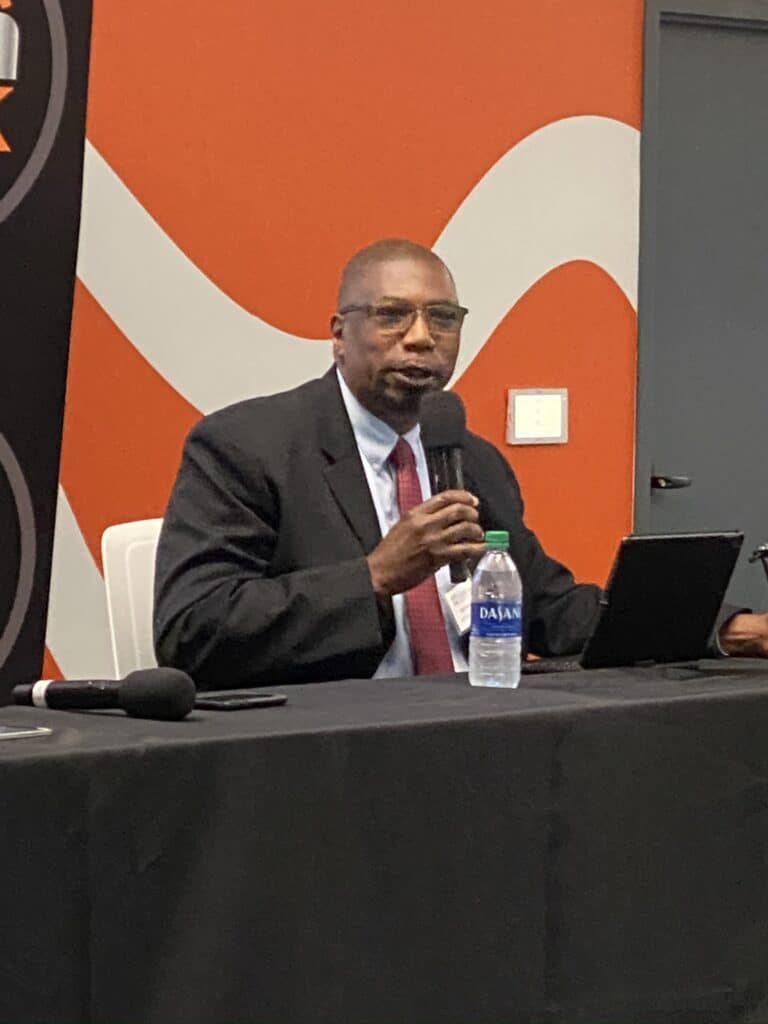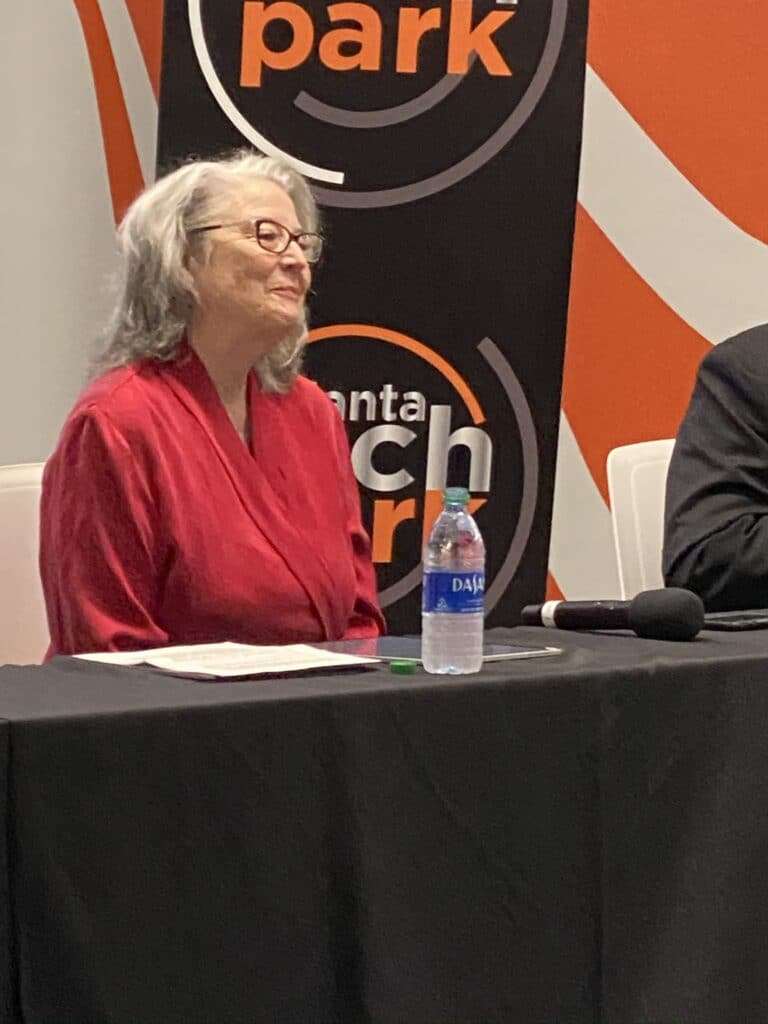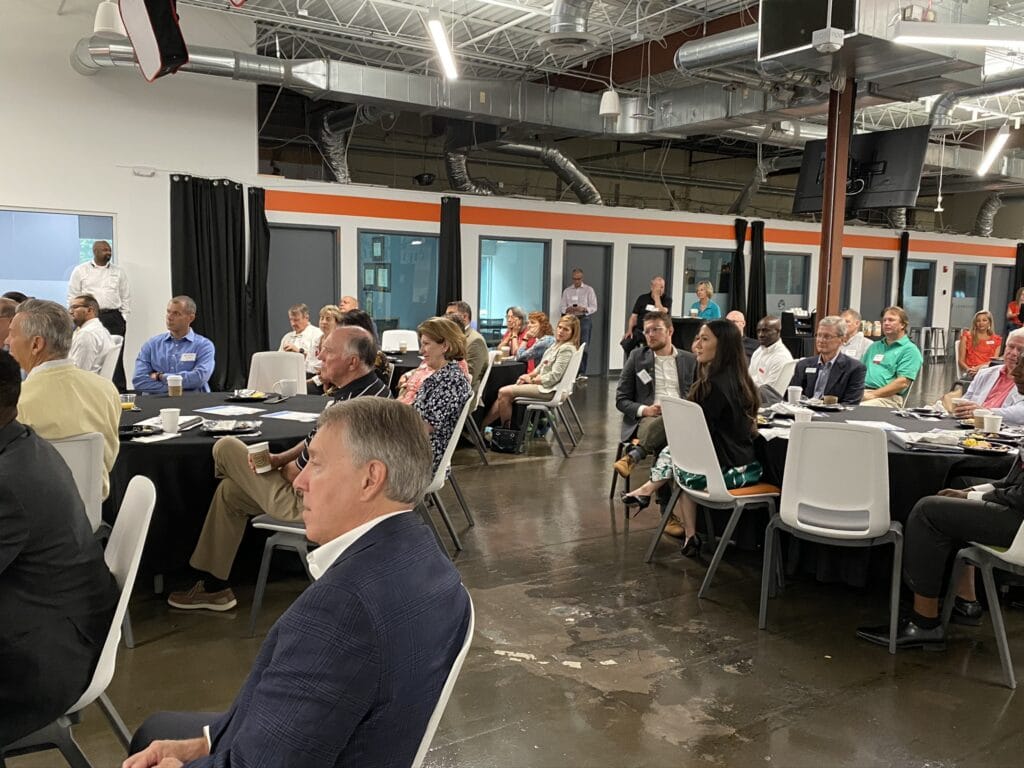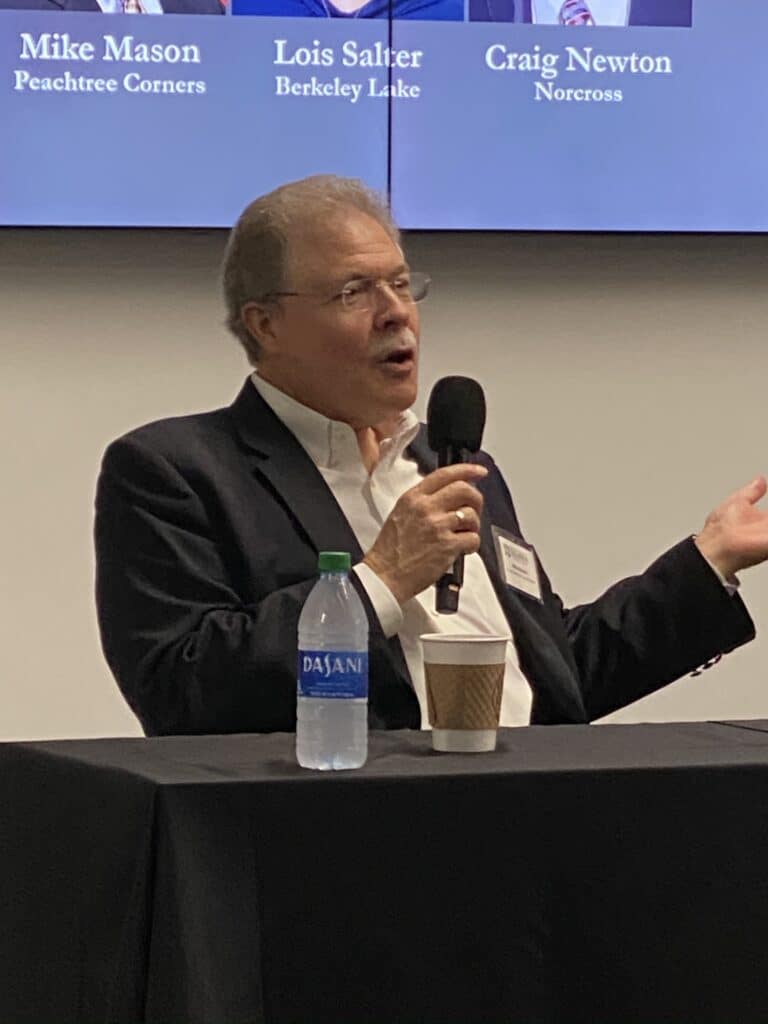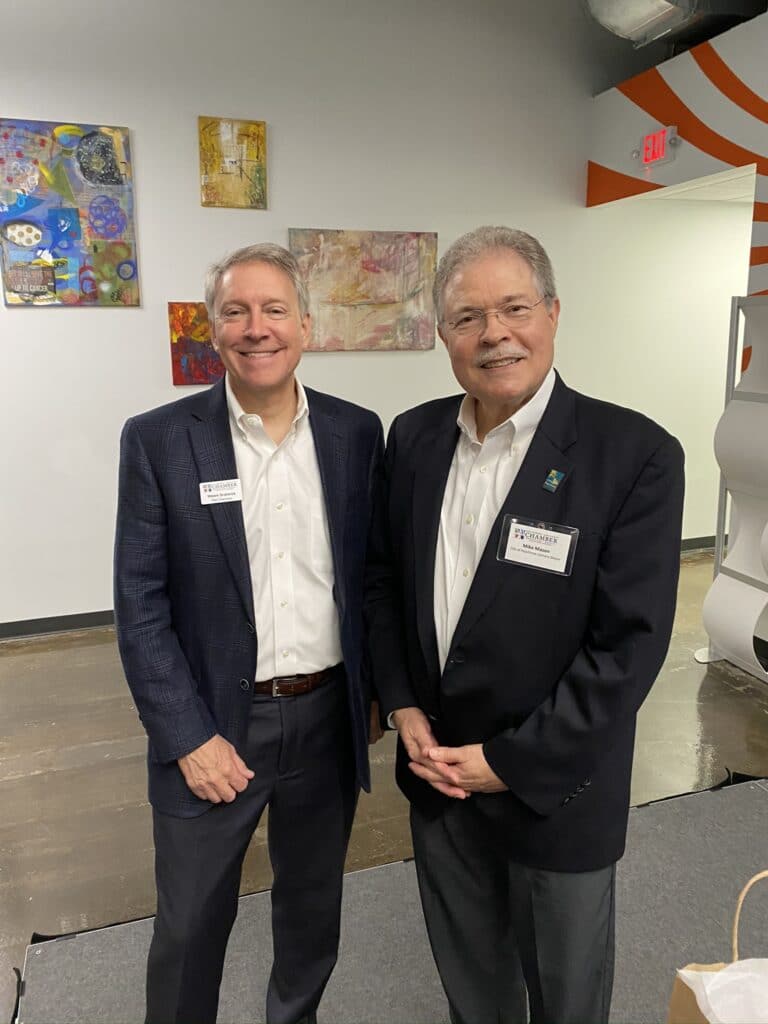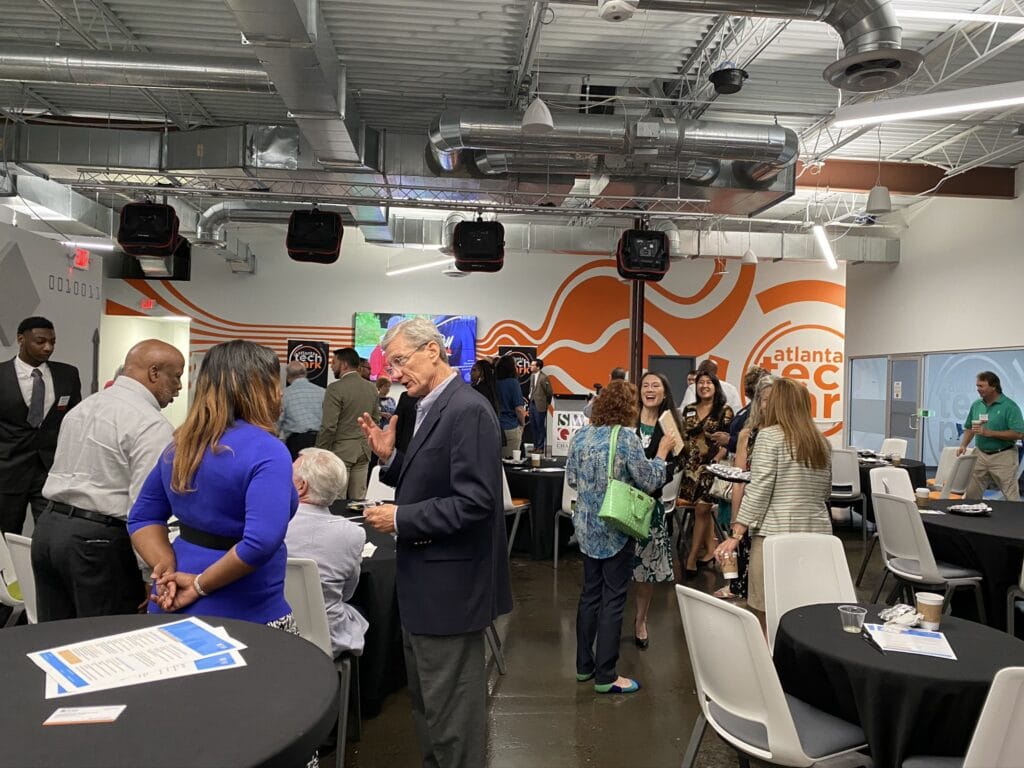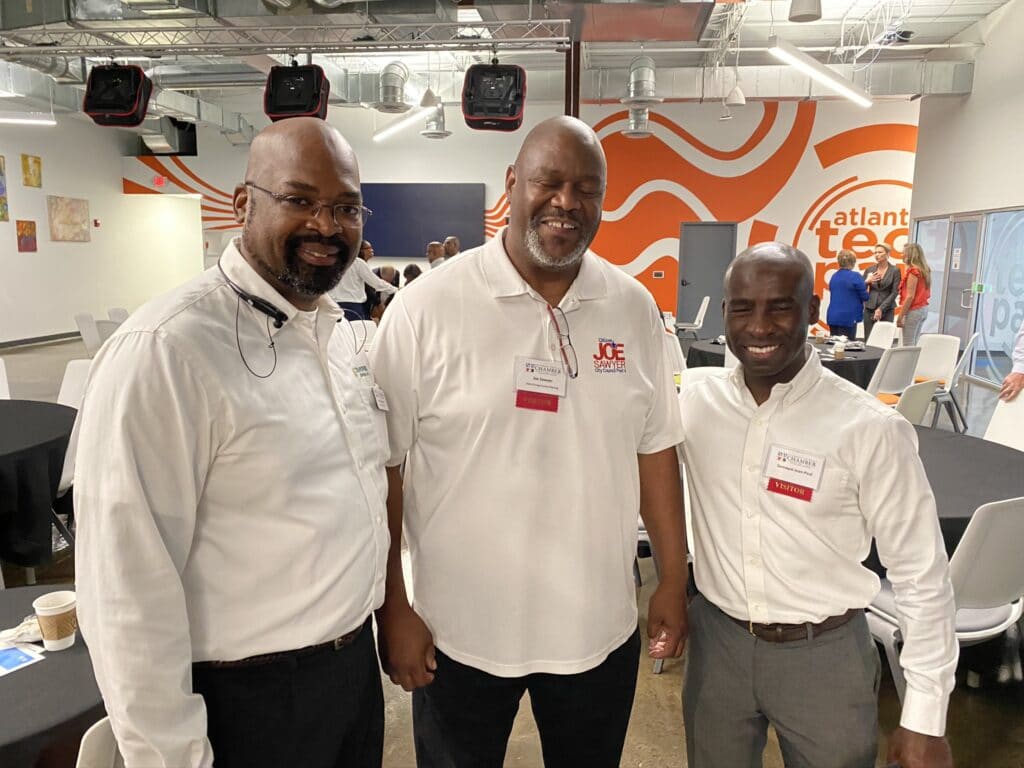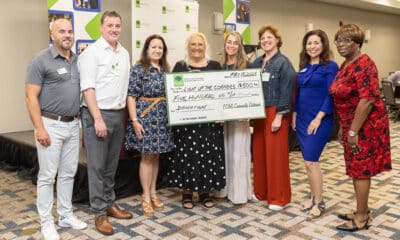City Government
Three city mayors discuss post-COVID-19 improvement plans
Published
4 years agoon
By
Mark Woolsey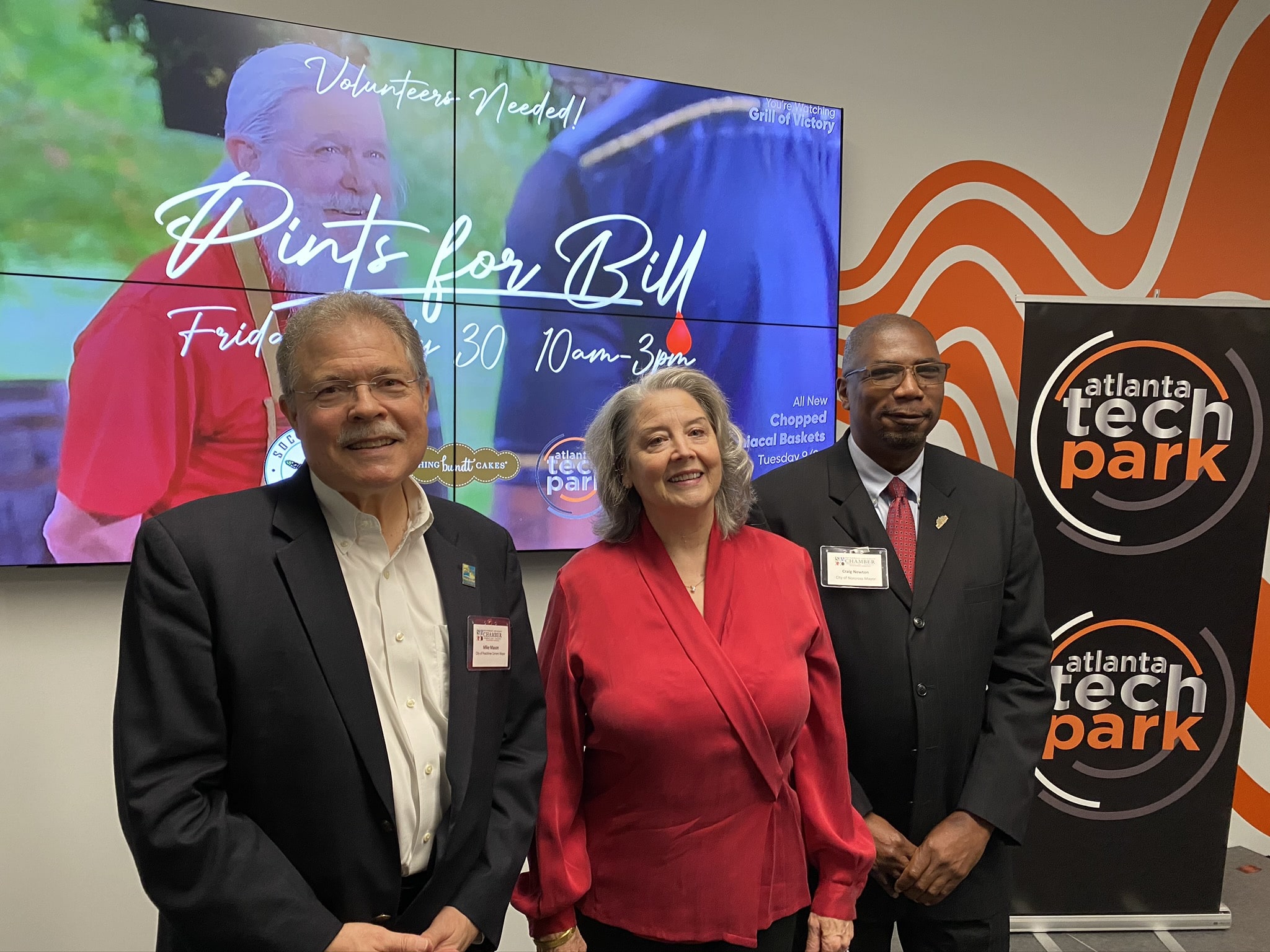
The mayors of Peachtree Corners, Norcross and Berkeley Lake shared their thoughts on improving the communities with American Rescue Plan money
A trio of Southwest Gwinnett County mayors talked about several aspects and impacts of the COVID crisis during a recent panel discussion, including how they were looking at spending money allocated to their cities as part of the American Rescue Plan Act (ARPA).
They also focused on challenges and changes emerging from the pandemic.
Mayors Mike Mason of Peachtree Corners, Craig Newton of Norcross and Lois Salter of Berkeley Lake fielded questions during a First Friday breakfast event hosted by the Southwest Gwinnett Chamber.
Plans for the cities
Mason outlined how his city created a mechanism to support small businesses with grants after Gwinnett cities received federal money under the earlier CARES act. Each qualified applicant received an allocation. He noted that in addition to the grants, air filtration and other protective equipment were also tacked on at city hall.
“With the ARPA money, we’ll do more of the same,” he said. Mason also said that plans are in the works to use some of the money to beef up broadband service in what are considered underserved areas of the city. He said some may doubt that a problem exists, but that it does.
“We learned during the pandemic that kids couldn’t get schooling from home, because if someone was in the living room watching TV, there wasn’t enough broadcast left for the kid in his room. If we can fix that, we’re probably going to try to do that.”
In contrast, Berkeley Lake Mayor Salter said that after spending considerable CARES money on sanitizing efforts and an air filtration system for city hall, they planned to go a different route under ARPA, using the federal funds mainly for stormwater infrastructure work. She said that with the city having no stormwater fee and with a preponderance of trees and hills, stormwater costs have been significant.
Norcross Mayor Newton was less definitive than his counterparts, outlining that the city has created a 12-member advisory group to make recommendations to the mayor and council on how to allocate funds. “So, we took the easy route. We turned it over to the citizens to help us decide how to spend some of this money,” he said.
Post-pandemic issues to consider
Addressing a related issue, Newton told the chamber audience that “we are not quite out of the woods yet on COVID,” contending that while declining case numbers and reopening businesses show that the vaccine is working, Georgia, as a state with a low vaccination rate, could be vulnerable to surges.
All three mayors agreed that the pandemic has been a long-term game-changer.
Several trends are important to consider in that regard, said Mason. He called for a show of hands and got a considerable response when he asked, “How many people are still working from home instead of going back to the office? That’s a trend.”
Also, residents continue to order more goods online, in his view, and he spoke about challenges in the hospitality sector, noting that Peachtree Corners has more hotel rooms than any other city in the county.
Mason said that with such mechanisms as Amazon readily available, people are reluctant to get into their cars unless a business is close by. To that end, he floated the idea of putting such residences as townhomes and apartments in closer proximity to commercial areas.
Newton noted that while businesses are optimistic about the long run, labor shortages and supply chain issues remain challenges in the foreground. Salter took a tack similar to Mason’s, saying that “it’s online everything” with resulting changes in the retail landscape and with jumping on a plane at Hartsfield to go out of town is giving way to a plethora of Zoom meetings.
Attracting and keeping residents a concern
The topics of affordable housing and of serving new residents while working to hang onto existing ones also came in for discussion. “As people begin to retire, you have to be ready to replace those retirees with a new generation,” said Newton. He added that recruiting qualified people leads to an expanded and better qualified workforce, which he said attracts more business and which, nowadays, is a more important factor than location.
In one tactic, he said the city of Norcross has positioned itself to attract more younger residents by hiring an events coordinator to focus on new entertainment and event programming. He also said that the city has joined forces with a state-sponsored program called the Georgia Initiative for Community Housing. The group has come up with some potential affordable housing solutions for Norcross to be discussed in the near future, according to the mayor.
Mason took Newton’s talk of replacing those leaving the work force with a new generation one step further, arguing for retaining retirees and their disposable income. “Do we really want to lose them to, say, Florida?” he asked. “No, you want to keep them in your city. And they want to stay. If you don’t keep retiring citizens in your city, you’re done for.”
The Peachtree Corners mayor touted adaptive reuse of existing buildings as the best solution for providing more affordable housing overall, and said news of such a project may be on the horizon. Tearing down and replacing aging apartment complexes on the city’s south side has been talked about, but Mason indicated the numbers may not work for developers.
Pointing out that her city is essentially built out, Salter said they have attracted a number of new residents nonetheless, with people tearing down existing bungalows and putting up larger residences. She said city efforts have centered around such events as July 4th programming and in providing a children’s park and other kids’ activities to bring residents together.
Leaders discuss cities’ goals
She struck a similar tone when the mayors were queried about their goals. “My goal is to preserve the cohesiveness that I think has come under somewhat of a challenge this past year with what we’ve seen in our larger political culture,” said Salter. “People are seeming more cranky with each other, for lack of a better word. It’s made me sad and concerned.”
She added that “it’s such a small town and we know each other well so I think the mayor has a little more ability to point people in a direction.”
Mason put weight on continuing “sense of place” producing efforts in the young city. He also pushed improving amenities such as walking trails, which not only can improve residents’ health but add value to homes as well, he said. He added the city also needs to continue working on both economic development and redevelopment of aging structures and that a number of alternative redevelopment strategies are being weighed.
“It’s not a simple question,” was Newton’s initial reply.
He said he’s focused on increasing economic vitality and quality of life by protecting the city’s downtown and expanded city center, which would include redevelopment and expansion to the east across Buford Highway. He said two other goals involve increasing public safety through improved technology and maintaining the sustainability of parks, historic structures and natural resources.
In considering all those initiatives, indicated his counterpart in Peachtree Corners, it’s important to remember that their impacts can easily stretch across city borders. “Craig and I say it to each other all the time,” said Mike Mason. “A rising tide lifts all boats.”
Related
City Government
Brandon Branham Honored for Transformative Leadership in Peachtree Corners
Published
2 weeks agoon
May 20, 2025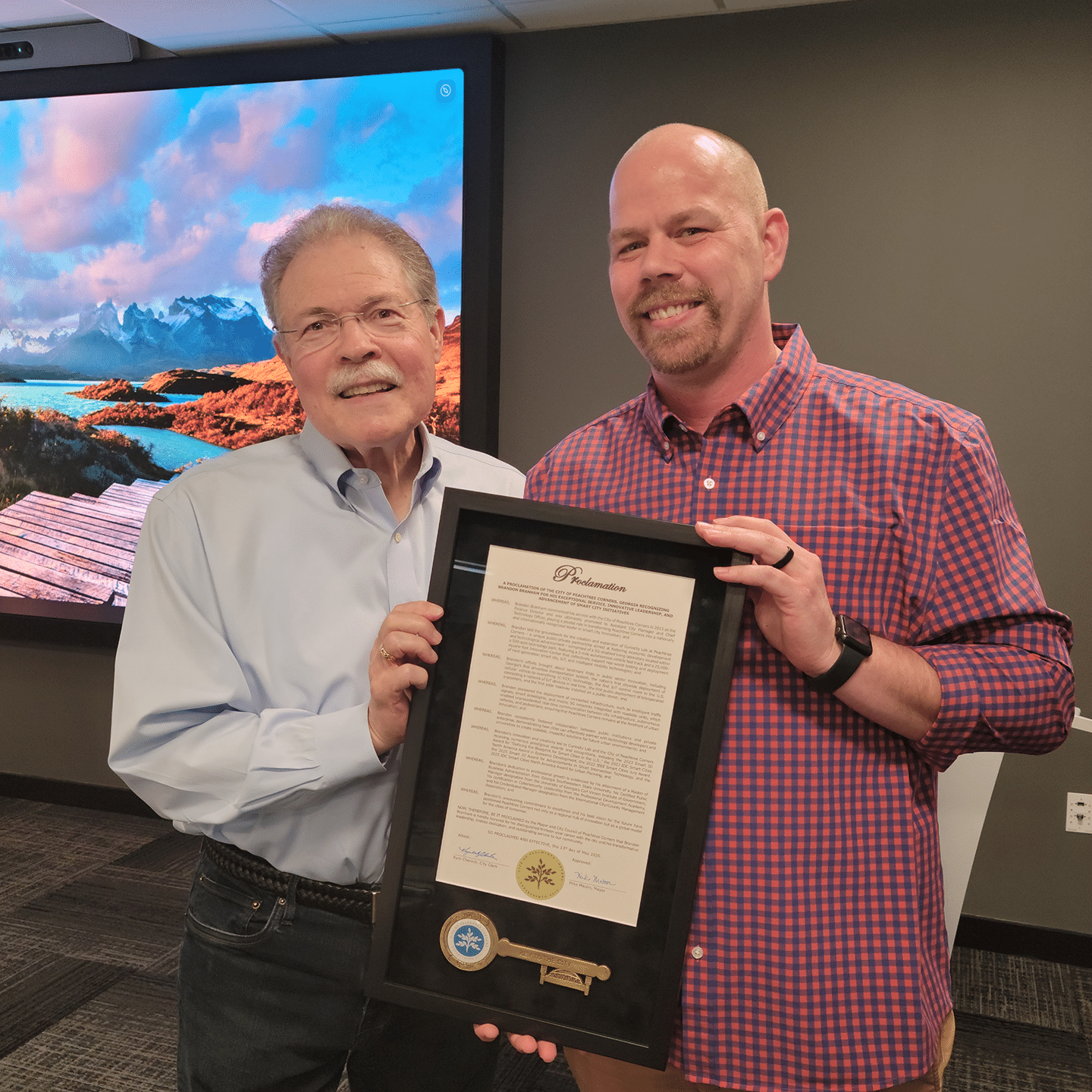
The City of Peachtree Corners recently honored Assistant City Manager Brandon Branham with an official proclamation for his years of leadership and service to the city.
Branham began his tenure in 2013 as finance director and was later promoted to assistant city manager and chief technology officer. In each of those roles, he’s played an instrumental part in guiding Peachtree Corners’ transformation from a suburban community into an internationally recognized hub of technology and innovation.
A decade of accomplishments
Among his many accomplishments, Branham spearheaded the development of the Curiosity Lab at Peachtree Corners, a 5G-enabled living laboratory and innovation center located within a 500-acre technology park.
Under his leadership, the city also achieved numerous national firsts in public sector technology, including the launch of Georgia’s first driverless shuttle system, the country’s first citywide C-V2X (cellular vehicle-to-everything) deployment and the first solar roadway installed on a public street.
“Brandon’s vision and commitment to innovation have positioned Peachtree Corners at the forefront of smart city development not just in Georgia, but across the nation,” said City Manager Brian Johnson. “His leadership has shaped the future of our city, and we are deeply grateful for his service.”
Partnerships and collaborations
Throughout his twelve-year career with the city, Branham emphasized collaboration between the public and private sectors, creating partnerships with tech companies and academic institutions to pilot scalable, real-world solutions.
His efforts have garnered numerous accolades for Peachtree Corners, including multiple Smart Cities awards and recognition for urban planning and intelligent mobility technologies.
New opportunities
Now, as Branham prepares to leave his role and move on to new opportunities, the City of Peachtree Corners “extends its heartfelt appreciation and best wishes for his continued success.”
“Brandon has left a lasting legacy,” Johnson said. “We look forward to seeing the impact he’ll continue to make in the smart city space and beyond.”
Related
City Government
Peachtree Corners Hosts Discussion About the Future of Local Policing
Published
3 weeks agoon
May 12, 2025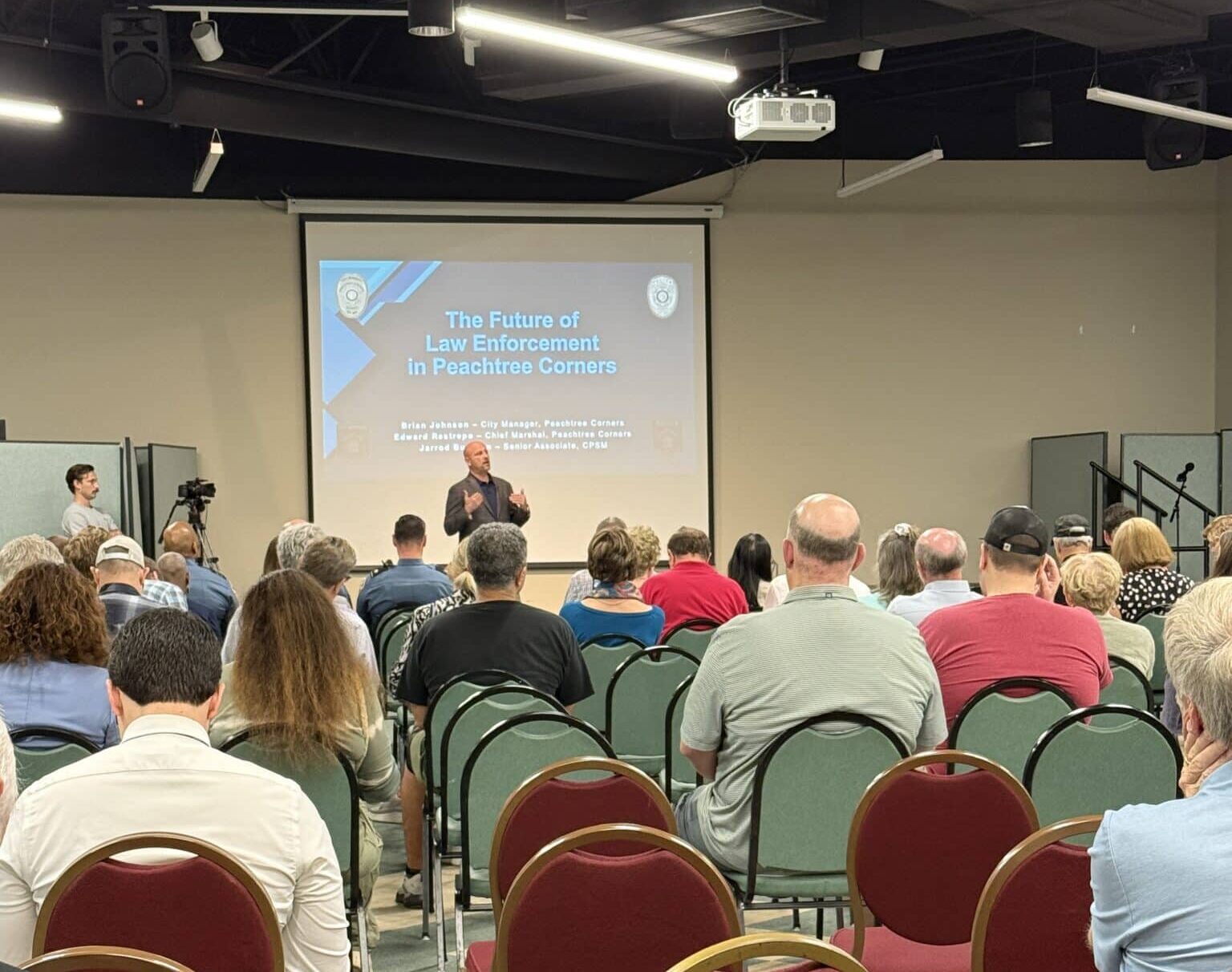
Although crime isn’t on the rise, and the Gwinnett County Police Department (GCPD) is fulfilling its role in fighting crime, the City of Peachtree Corners is asking residents, business owners and city stakeholders if they believe the city should form its own police department.
With over 100 people in attendance, City Manager Brian Johnson led the discussion about the future of policing in Peachtree Corners. He presented the findings from a survey conducted by the Center for Public Safety Management (CPSM), a nationally-recognized law enforcement consulting and training firm, as well as information about patrol officer staffing, response times, costs to tax payers and a potential timeline.
Ensuring public safety
Johnson kicked off his presentation by explaining that it is the duty of the mayor and city council to ensure public safety, including reviewing law enforcement.
“Maybe it needs to grow, maybe it needs to change its focus. But city council is the one that has the decision-making responsibility,” he said.
He was also adamant that this isn’t a done deal.

“I hit this point already, but I want to hit it again. This is the start of a conversation, a community conversation and feedback to council. There hasn’t been a decision,” he said. “Council has not received this presentation from me. They’re here to watch and learn from your feedback of this.”
Mayor Mike Mason was present at the meeting, along with all of the city council members except Eric Christ who was out of town and watching remotely.
Issues and obstacles
Johnson explained that the grounds for the inquiry were based on issues about communication, access to information and enforcement of city-specific ordinances. He cited an example where a city rule that private residences can’t be rented on a short-term basis like Vrbo or Airbnb wasn’t enforced by GCPD. An owner tried to circumvent the ordinance by only renting the outside of the house. A loud pool party ensued, and frustrated neighbors dialed 911.
“Officers showed up and they said, ‘We can’t enforce the city’s noise ordinance,’” Johnson said.
The first stage to fix this problem was creating the marshal program to bridge the gap between code enforcement and GCPD.
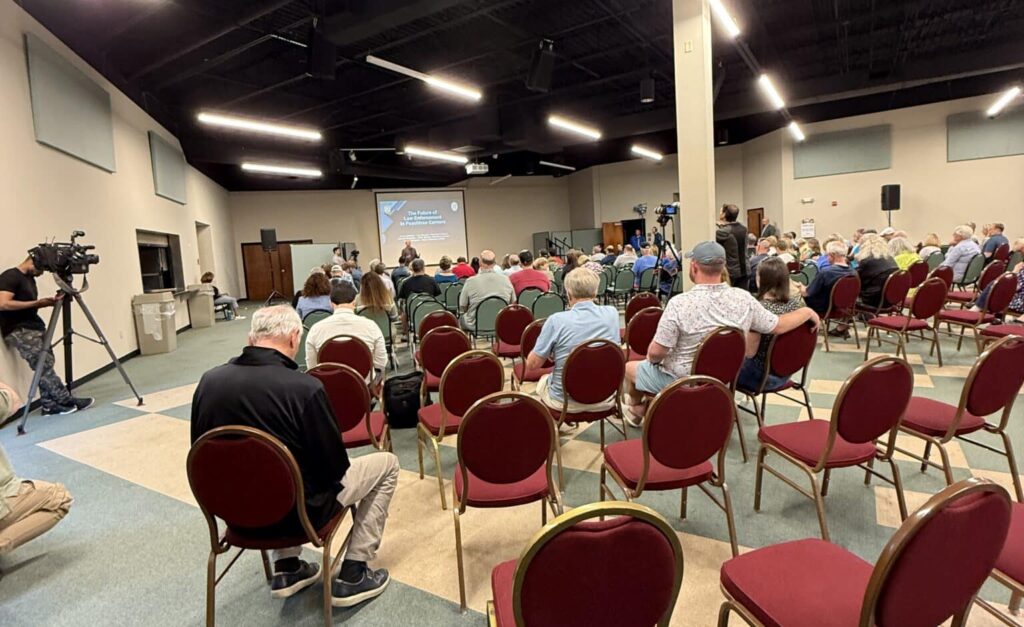
“[We thought] they would be able to enforce both local ordinance and state law, since they are a function of the city, and they could maybe be a force multiplier for Gwinnett since [marshals] don’t have to respond to 911 calls,” said Johnson.
But other issues arose shortly after the department was formed.
“We were still working towards getting that good balance, but we have been faced recently with a couple of things that make it harder for us,” said Johnson.
Seeking shared access
Instead of GCPD giving PTC marshals read-only, quick access to incident reports, dispatch calls and other information, the marshals department was required to file open records requests through the same process as any civilian.
“They were denied, as well as the city of Sugar Hill, [when] asked for the ability to see, not change, but see the computer-aided dispatch information, so that they would know where Gwinnett County police officers were; so that they could avoid stepping on their toes or maybe looking to support their efforts, and they haven’t been granted that,” said Johnson.
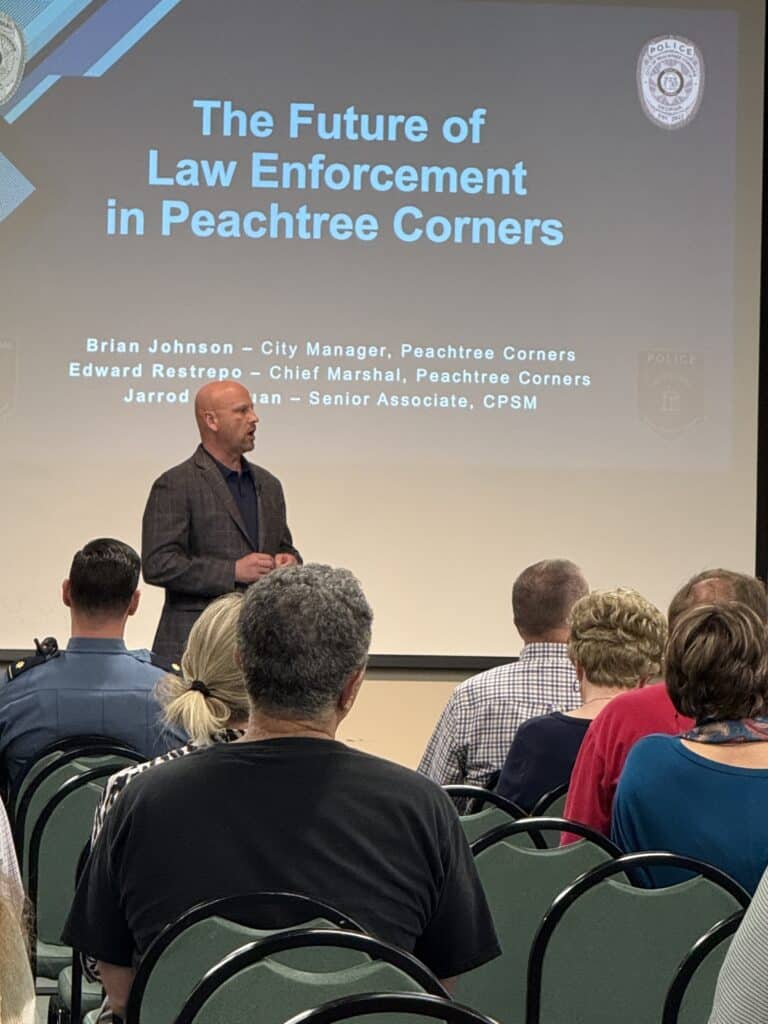
He added that the GCPD has video cameras on certain roadways that are used for various reasons, and law enforcement can use them when there’s crime in the area. Peachtree Corners marshals were denied access to those cameras.
“Conversely, we have a couple hundred cameras in the city, and we definitely want them to have access to them,” said Johnson. “So the frustration out of not being able to get that symbiosis between the marshals and police made us start thinking, all right, you know, is there another option?”
Community feedback
CPSM utilized data from GCPD to discern if Peachtree Corners could feasibly stand its own force. It also took into consideration crime trends, costs and many other factors. It recommended a 55-officer department, costing $12.1 million annually, with a $2.2 million upfront cost.
Comparing the two options to “renting vs. owning” the primary law enforcement agency in the city, Johnson presented pros and cons for each. Once the question-and-answer portion began, there was no obvious choice. Men and women, young and more advanced in age, had both similar and differing opinions.
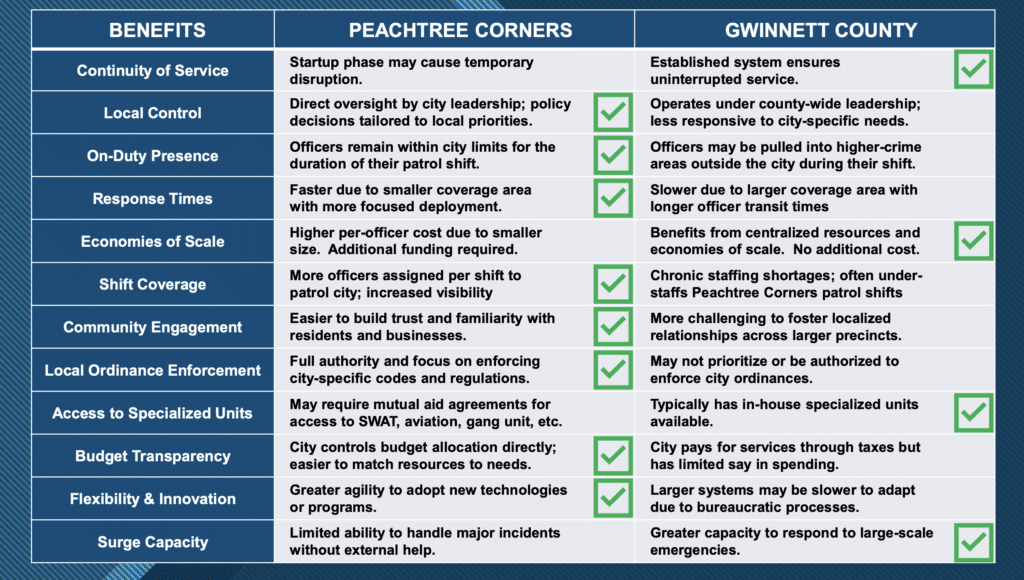
One young man, who identified himself as a local small business owner named Alexander, argued that with artificial intelligence increasing the efficiency of administrative tasks, perhaps the city wouldn’t need a full 68-man department of civilians and sworn officers.
Some accused the city of devising a solution in need of a problem. Others were concerned that paying approximately $100,00 for a study was throwing good money after bad.
But at the end of it all, the city is continuing to seek feedback and is encouraging everyone to make informed decisions. The meeting was taped and is available on the city website along with Johnson’s PowerPoint presentation, a copy of the study done by CPSM and a survey.
As far as a timeline goes, city officials would like folks to take the summer to mull it over and come back in the fall to take another look at the proposal.
Related
City Government
City of Peachtree Corners Awarded Certificate of Achievement From GFOA for Seventh Straight Year
Published
3 weeks agoon
May 9, 2025
The City of Peachtree Corners’ finance department has been awarded a Certificate of Achievement for Excellence in Financial Reporting from the Government Finance Officers Association of the United States and Canada (GFOA) for its 2024 financial year-end comprehensive annual financial report (CAFR).
The GFOA’s Certificate of Achievement is the highest form of recognition in governmental accounting and financial reporting, and its attainment represents a significant accomplishment by a government and its management.
It is the city’s seventh year of receiving the award and represents a significant accomplishment by the city’s finance department and its leadership.
According to a GFOA release, “The report has been judged by an impartial panel to meet the high standards of the program, which includes demonstrating a constructive ‘spirit of full disclosure’ to clearly communicate its financial story and motivate potential users and user groups to read the report.”
“We are pleased to again receive this honor,” said City Manager Brian Johnson. “Our finance department, and Finance Director Cory Salley, are to be commended for this achievement, as it is the highest form of recognition GOFA presents.”
A comprehensive annual report
The city’s finance department produces the CAFR each year and works with independent auditors to verify the city’s financial situation and standing.
“This prestigious award affirms Peachtree Corners’ dedication to exceeding basic requirements by producing comprehensive annual financial reports that reflect a strong commitment to transparency and full disclosure,” said Assistant City Manager Brandon Branham.
About the GFOA
The Government Finance Officers Association (GFOA), founded in 1906, represents public finance officials throughout the United States and Canada.
The association’s more than 20,000 members are federal, state/provincial and local finance officials deeply involved in planning, financing and implementing thousands of governmental operations in each of their jurisdictions. GFOA’s mission is to advance excellence in public finance.
To learn more about the GFOA, visit gfoa.org.
For more about the City of Peachtree Corners, visit peachtreecornersga.gov.
Related
Read the Digital Edition
Subscribe
Keep Up With Peachtree Corners News
Join our mailing list to receive the latest news and updates from our team.
You have Successfully Subscribed!

From Boardrooms to the Himalayas: Vandana’s Journey to Purpose and Growing with Intention [Podcast]

Guardians of the Jukebox to Play the VoxStage on May 31

Brandon Branham Honored for Transformative Leadership in Peachtree Corners

Music Matters Productions Expands Peachtree Corners Headquarters

“Geek Culture” Shines at 2025 MomoCon

Celebration and Community: ICAGeorgia Wraps Up School Year with Two Festive Events

Vox-Pop-Uli Launches RED Initiative for Veterans’ Support

The PCBA Awards $500 to Light Up The Corners at After-Hours Event

Vox-Pop-Uli Launches RED Initiative for Veterans’ Support

The PCBA Awards $500 to Light Up The Corners at After-Hours Event

“Geek Culture” Shines at 2025 MomoCon

Celebration and Community: ICAGeorgia Wraps Up School Year with Two Festive Events

Guardians of the Jukebox to Play the VoxStage on May 31

Music Matters Productions Expands Peachtree Corners Headquarters

Brandon Branham Honored for Transformative Leadership in Peachtree Corners

From Boardrooms to the Himalayas: Vandana’s Journey to Purpose and Growing with Intention [Podcast]

Light up the Corners [Video]

Capitalist Sage: Business Leadership in Your Community [Podcast]

Cliff Bramble: A Culinary Adventure through Italy

Top 10 Brunch Places in Gwinnett County

A Hunger for Hospitality

THE CORNERS EPISODE 3 – BLAXICAN PART 1

Top 10 Indoor Things To Do This Winter

The ED Hour: What it takes to Remove Barriers from Education




